Tim Dee is still living and trying to do so in a seaside suburb of Cape Town, South Africa. Chacma baboons have long been residents of the same rocky coastline. This happened in May.
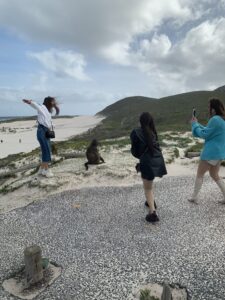
Gnarls Barkley: ‘I remember when I lost my mind…’
One crazy hour at the southernmost limits of Ape Town. We had wanted to play on the sand dunes at Platboom on the Atlantic shore just up from the Cape of Good Hope, but when we arrived there (me, Claire and Adam, and our friend Mark), the local baboon troop were already installed, walking between the vehicles in the beach carpark and coolly in possession of the wider estate. ‘Baboons are dangerous wild animals and attracted to food’, the signs say throughout the National Park at Good Hope. But in the carpark three city-smart women tourists were excited to see some monkeys so apparently tame – a junior male didn’t balk when they surrounded it only an arm’s length away – and the visitors took pictures of one another posing next to the shaggy grey attraction.
The trio of women left for the sea views from Good Hope and the baboon troop moved on towards the ocean. We finished our picnic in the car – we knew not to tempt the baboons by eating bananas or anything else in their sight – then shouldered our bags and walked for fifteen minutes up the sand dunes. We shouldn’t have. We had no edibles with us, but we hadn’t thought how, here at Platboom, most of the foodstuffs that baboons are known to hijack from humans comes out of bags. Picnics arrive on beaches in backpacks. Our bags had beach-toys and cameras and sun-cream, and no food, but they were still bags. That was our mistake.
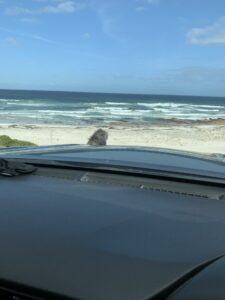
The error of our ways was shortly to be acted out in a scene from the continuing co-evolution of our two species. In the heat of the moment, it seemed we might be killed before we could reflect on that matter. In the heat of the moment its matter was all. Everything squeezed hot and hard and fast into an active now. We’d made a cheerful sandpit of the dunes. A baboon turned the same into a cockpit of conflict on the planet of the apes. I had tumbled with Adam in soft play. Claire had taken photographs of our japery. Mark had found footprints, with claw- and scuffle-marks, and tracked a dune-slope encounter of what he thought was a caracal and a baboon. We were all happily unguarded until Claire, looking through her camera, detected a tightening of the scene as the big male baboon of the troop launched itself in attack across the open sand from two hundred metres away. It picked up speed fast, a lollop-gallop became a thunder-charge, a body primed as ordnance. It homed in; we were the target, discovered in an instant as players unwittingly thrust into the middle of a drama where it was the fifth act already – the one where bodies pile up on the stage. Claire stood up and clasped Adam to her side. Mark sliced open a little toe on a sharp rock as he scrambled to join our defensive circle (he later discovered that he broke a toe bone). I tried to arm myself with a toy spade.
In the moment of our meeting something very ancient flooded the present presence of both us mammals. We’d been there before. In the thick of it. But while the baboon knew that and seemed to have all that history at the front of its mind, we apparently had fallen away from any such knowing or forgotten or lost it. This meant that the now was the baboon’s not ours; this meant that the baboon made time while we were out of it. Although we had recent and personal knowledge of other assaults (even on the same beach), we had nothing available in those charged seconds to take charge of this attack. The baboon acted; we could only react. It had a strategy; we surrendered. It was plastic – as in supple; we were coal – as in petrified. It was alive in its motions; we were losing it – our living – in ours.
All at once the baboon was violently there and I raised my arms to gesture STOP, as if – still not getting it – I was like a referee outside the event rather than a target at its crux. I’m a nature-lover, I know of ecosystems, I am a student of inter-species relationships, but I was caught out on the dune in my having – before that moment with very few exceptions – done nature as an observer from somewhere beyond, or other than, or even after, its event. I loved to see wild animals. I liked to think how the vinegary ego of my human selfhood was diminished by attempting a kind of neighbourliness with wild things. I thought I might somehow take part in plain animal existence by paying animals plain attention. I hadn’t figured on being killed by a monkey.
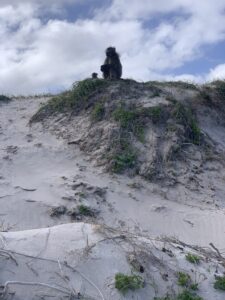
At spitting distance from us, the baboon leapt to a standing stop, dismounting its own ride, converting all the torqued energy of its charge into a horrible cobra-boxer dance: the swaying grey brawn of a mighty beast, right there right now, terrifyingly close. All at once. Its face, above all. A ferociously wide-stretched mouth barking and snarling and snarling and barking, with long sharp orange canines – four, two up and two down, it seemed essential to count them in their hell-yawn and, somehow, I found a glitch in time to do so. There were armies of other teeth behind, as well; I saw and heard its entire mouth but, above all, I felt it. Chemically. The hyperreality of detail seared into whatever enzyme responder ducts I had within, and I surged in reaction. All of me was adrenally drenched in a moment. Bigging myself as the baboon had; I shambled, I barked, wide-mouthed, thin-eyed, I aped. I remember looking for its dark eyes, thinking I would better there read its true intentions, but they were hardly visible, nothing more than tiny bitter blebs (Vladimir Putin’s are the same). Its teeth and its roar said everything it wanted. I concentrated on those.
I barked back (I was battle-sore hoarse with it – as if scarred – for three days afterwards). Adam’s spade was now out of reach, so I scrabbled at sand. I wanted to stop its mouth. My nemesis was shorter than me, like a troll, but I felt it going back a long way, like a troll: the bulk of its body, and aeons of baboon life. I was new to this; it was a seasoned veteran. I kept looking quickly over my shoulder at Adam. I was fighting for my boy. Claire had picked him up, but he still looked very slight and small. He was crying. We were all crying. Another lunge from the orange teeth. Mark had picked up both our bags. There was no sense of anything possibly finishing. We were to fight like this forever. The baboon came closer, tapping unlimited righteous energy. I felt its legitimacy, its claim. We moved back. I threw a feeble fist of sand. I roared my second-hand roar. He barked some more and cursorily brushed the sand from his chest and face.
It all happened in the traumatic slow-motion of thickly compressed time. Afterwards none of us humans could say how long it had lasted. Perhaps just one minute. But since it seemed we had been fighting for our lives it might have lasted all our lives. And in the Papio-Homo fight, old evolutionary knowledge kicked in alongside the adrenal flood – both of us primates lived our species’ long co-evolved stories, the hairy and the naked ape, some of the oldest news out of Africa was going live once again.
Mark got the message first. He had thrown his shoes at the baboon to no distracting effect and then shouted that we should give the baboon a bag. Trapped in the sandpit stalemate of our rhyming snarls, I had thought of nothing except unending strife. Once our lunge-and-bark battle had been joined, I had had no headspace to think about what the fight was for. I barked and lunged; it was all I could do. But Mark’s instinct was right. Claire’s bag was sacrificed – her camera, by good luck, was around her neck – and thrown like a dead offering to the hairy feet of our attacker. It worked: all calmed in seconds; the baboon took its prize. That was what it wanted. The food it thought would be within. The magic sack. We were just porters or waiters. Its teeth were not for eating us up with, but to press its claim for a nana or a naartjie.
The baboon sat and bent to work the multiple zips of the rucksack and tore open a hand-wipe sachet (for its alcohol whiff?) but got nothing otherwise to eat. It looked suddenly wretched like that, and primitive. Neither did it react to the fruitless outcome of its fight. Perhaps it had no thought for such. But it was detained long enough by the bag to allow us to retreat down the dune and hurry back towards our car. We retraced our steps: Adam’s outbound footprints in the sand crossed over the tracks of the baboons. They were of a similar size and a similar appearance, our three-year-old boy’s just a little less long in the toes.
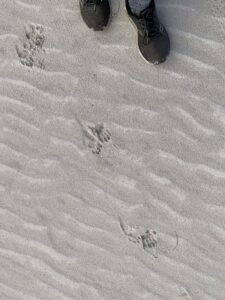
As we had walked away from our mugging and Claire’s abandoned bag, other members of the Platboom troop had run to the rummage. Big daddy had moved on by then. We didn’t lose anything material. After half-an-hour of hyperventilating victimhood – talk, deep breaths, talk, nervous laughter, talk – in the locked car in another carpark at Cape Point, we went back to Platboom. I was still high but trekked alone to the dune as to a battlefield at the end of a day of war. The fight had been strangely good for me: I had never felt my movements less hindered or Parkinsonian in all the five-odd years since my diagnosis; I had come to life in fear. At the spot, I collected scattered shoes and the spade and the rucksack. A shit had been taken on it, a calling card. Claire hose-washed the bag on the next good drying day we had and hung it outside our house on the line. Like a battle-worn standard, I thought, a flag taken home from a fight; like my bag, she said, cleaned of baboon.
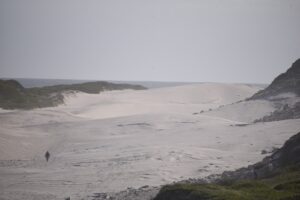
Devo: ‘Are we not men? …’